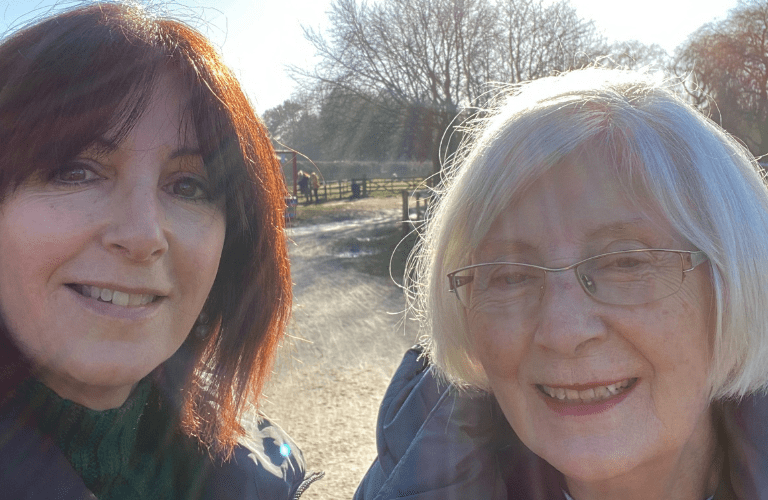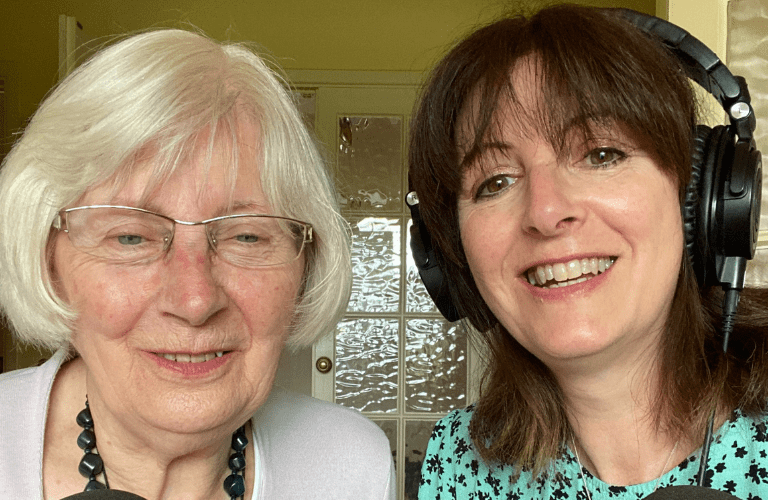Penny’s story: "Life doesn’t have to stop after a dementia diagnosis"
Penny speaks about her relationship with mum Rosemary, who has mixed dementia, and how the Admiral Nurse Dementia Helpline has helped her.

Penny and her mum, Rosemary
My Mum, Rosemary, was always a happy, chatty, and sociable person. She was a talented Scottish musician who moved to England with her family to train at the Royal Academy of Music. She played piano, oboe, viola and sang. Mum was a big part of the community where she lived for over 50 years – she helped organise the local music festival and was the Musical Director for many local productions.
I first noticed that something wasn’t right when Mum started struggling to process information. She repeated things a lot and couldn’t manage her diary. This went on for five years before Mum was diagnosed with mixed dementia in 2016.
How the Admiral Nurse Dementia Helpline helped
As her dementia progressed, Mum started asking where everyone was, emptying cupboards looking for food, and getting upset and confused. It always happened late afternoon or evening.
I called the Admiral Nurse Dementia Helpline for some advice, and the specialist dementia nurse explained that Mum was experiencing ‘sundowning’ – a state of intense confusion and anxiety that typically happens around dusk. She was reverting back to old routines and habits around family mealtimes to help make sense of things. The advice the nurse gave me meant we were able to anticipate Mum’s sundowning and try to occupy mum her other things before she got caught up in it.
However, the sundowning episodes got worse and Mum began walking out of the house on her own into the street, confused, and asking for help. Although she had lots of carers, this happened in between visits and we realised she was not safe at home on her own.
I knew it was time for Mum to go into a care home, but I really struggled with making that decision. Again, I phoned the Helpline – it was so helpful to speak to an Admiral Nurse who reassured me that it was the right thing to do and helped me to plan.
The Admiral Nurses have also been a great emotional support to me. I’ve spent a lot of time crying on the Helpline. It’s just such a relief to be able to speak to someone who has specialist knowledge about dementia and understands what we are going through. The Admiral Nurses on the Helpline take time to understand our circumstances and give solutions, help and advice. I don’t have any other professional support available to me, and I couldn’t have coped without the Helpline.

Penny and her mum, Rosemary recording their podcast together
Discovering Dementia
I started the Discovering Dementia podcast with Mum when I realised that people are often isolated after getting a dementia diagnosis. Mum and I hoped the podcast would help other families in a similar situation to feel less alone.
Mum was also very keen to reduce the stigma around dementia. Dementia can progress very gradually – she didn’t change overnight. She wanted people to know that she was still the same person after the diagnosis.
I ask for Mum’s consent every time we record an episode. She has never said no, as she thinks it’s important for her to share her experiences. The podcast has evolved, and we are now working on the third series. We won a British Podcast Award, and each time I tell Mum we won, it’s like I’m telling her for the first time as she doesn’t remember. She is still shocked and so happy every time I tell her, which is lovely to relive.
Our mother and daughter relationship
Mum and I have always been close, but recording the podcast has helped us navigate the inevitable changes in our relationship. I am a carer now as well as a daughter. The podcast has allowed us to have open discussions about how we feel. It has also helped us to plan and talk about what care might look like for Mum in the future.
Mum also still loves music, and she still remembers how to play the piano. She continued to teach piano after the diagnosis, and prior to the pandemic, she sang in two choirs and played piano in a care home. Music is so important to her, and it keeps her mind active.
Life doesn’t have to stop after a dementia diagnosis, and I can still spend time with Mum doing things we both enjoy. We went on a Dementia Adventure holiday together which was lots of fun and something we wouldn’t have done otherwise. Mother’s Day is another day where we get to spend some valuable time together. We will catch up, video call the grandchildren and enjoy some tea and cake!
Penny hosts the Discovering Dementia podcast with her mother, Rosemary.
Spreading awareness of Admiral Nurses
I found myself calling the Helpline in moments of crisis. At those times, you just need someone who tells you what to do to get out of a particular situation. It was so great to speak to a dementia specialist, the Admiral Nurse is immediately with you in that situation. Once I understood Mum’s behaviour, it was much easier to deal with.
I decided to take part in the World Alzheimer’s Month campaign with Dementia UK as I want to do anything I can to spread awareness of Admiral Nurses. We need more of them. It’s been a long journey for us, it would have made such a difference to have had an Admiral Nurse from the beginning. But the Helpline was invaluable. There isn’t anything else out there that offers that support when you need it in the moment. More people need to know about the Helpline and virtual clinics services, so you can speak to a nurse even if you don’t have one in your local area.
I am now a Dementia UK volunteer ambassador and local community events to talk to people about the charity. I’ve realised how little people know about Dementia UK and the support available to them. That’s why talking about dementia and raising awareness is so important.
